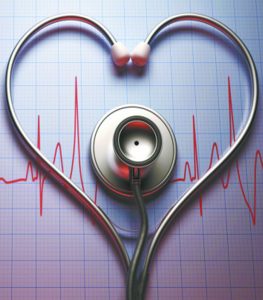T.E. Vallabhan, MD, FACC
 Commonly reported, stress levels, anxiety, depression, and our overall emotional state has a significant impact on our health. From physical pain, appetite changes, suicidal thoughts to our vascular health, the way we deal with and treat mental disorders are critical on our long-standing wellness.
Commonly reported, stress levels, anxiety, depression, and our overall emotional state has a significant impact on our health. From physical pain, appetite changes, suicidal thoughts to our vascular health, the way we deal with and treat mental disorders are critical on our long-standing wellness.
How Our Mental State Affects Our
Cardiovascular Health
Emotional stress is a huge factor in blood pressure spikes. Along with anxiety, we often sometimes pick up bad habits like not getting the proper amount of sleep or eating unhealthy foods, like excessively salty and fatty fare, or we’re drinking too much alcohol. All of these issues can raise our cholesterol levels, and when we drink too much alcohol, it can also cause ventricular fibrillation. Ventricular fibrillation causes rapid, electrical, stimulations in your heart and you may experience a dangerously high heart rate.
Atherosclerosis is the hardening of the arteries due to a buildup of plaque caused by high cholesterol in the blood. When those particles of plaque break away, they can cause coronary arrest. Along with higher than normal cholesterol levels, stress and anxiety can disrupt this preexisting plaque, making patients more susceptible to heart attacks and arrhythmias.
During unhealthy emotional episodes, we sometimes shut our selves in and don’t exercise regularly, because of depression and fear. This can have a greater effect on someone with a current heart condition. It’s imperative to keep yourself healthy through exercise, eating right, and managing stress.
Many people ignore the symptoms of a heart attack. People may feel chest pains or experience shortness of breath but put it off, because they are too busy, or too drained to consult with their physician.
Heart Attack Symptoms
• Chest Pain and tightness
• Lightheaded
• Dizzy
• Tired/Fatigue
• Shortness of breath
• Anxiety
• Rapid heart rate
• Sweating
• Gray color to the skin
• Arm/Shoulder pain
• Abnormal heart palpitations
Depression and your Heart
One of the most common ailments that doctors treat annually is depression. Nearly 15 million people in the United States are affected by depression. Persistent Depressive Disorder or PDD is a chronic type of depression that usually last for more than a year and can be difficult to treat successfully.
The typical treatment options for PDD are antidepressant medications and counseling therapy. Some of the most common drug classes prescribed are selective serotonin reuptake inhibitors (SSRIs), serotonin-norepinephrine reuptake inhibitors (SNRIs), tricyclic antidepressants (TCAs), and monoamine oxidase inhibitors (MAOIs). The widely known drugs, like Prozac, Zoloft, and Cymbalta play a role in how the neurotransmitters affect the mood by lessening anxiety levels and creating a more peaceful, cheerful spirit.
While the treatment options mentioned above are helpful for some people, the problem lies in two distinct categories. Number one, depression is just a simple label that is placed over a very complicated, in-depth, disease with countless causes. And numbers two, a vast majority of patients do not respond well to the medications prescribed. The good news is that there is are alternative therapies and behavioral counseling methods that have helped numerous of patients.
If you have any mental health-related disorders or feel like you need someone to talk you through depression, please seek medical help as soon as possible. The earlier you get the help you need, the better your outcome will be, along with alleviating additional stress on your heart and your general wellbeing.
Dr. Vallabhan
352-750-2040
Rolling Oaks Professional Park
929 N US HWY 441, Suite 201
Lady Lake, FL 32159
Tags featured
Check Also
Revolutionizing Neuropathy Treatment: The Summus Laser Approach at LaserLab
Neuropathy, a condition affecting an estimated 42.5 million Americans, can significantly impact one’s quality of …
 Central Florida Health and Wellness Magazine Health and Wellness Articles of the Villages
Central Florida Health and Wellness Magazine Health and Wellness Articles of the Villages



